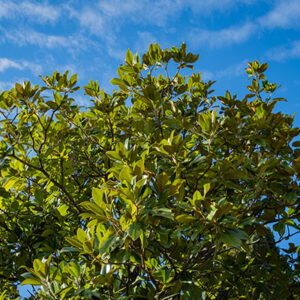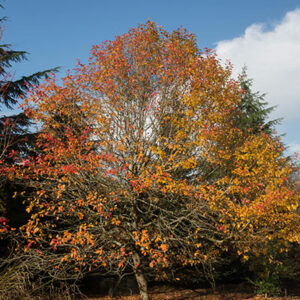Spring is just a few weeks away! Soon it’ll be time to break out the crabgrass control, dust off the lawnmower, and decide what the landscaping projects will be. If one of those projects includes adding a tree to your yard, consider one of these varieties. All are native to Texas, which means they’ll have an easier time adjusting to our hot climate.
Best Native Texas Trees To Add To Your Landscape This Spring
Cedar Elm (Ulmus crassifolia)
Unlike other elm varietals, our native cedar elm has smaller leaves, which helps these trees endure our hot, dry climate. When properly cared for, you can expect your cedar elm to live for over 100 years and reach upwards of 90 feet in height. Cedar elms grow at a moderate rate and tolerate both alkaline and poorly drained soil. In fall, expect a burst of yellow color. If your primary concern is providing shade to your property, a cedar elm is an excellent choice. That being said, cedar elms are notorious for their drooping branches that usually require a bit more maintenance compared to other tree species. These low-hanging limbs should be treated with a yearly tree spraying program, as they may attract fungal diseases and other pests. That being said, cedar elms are relatively low maintenance and will make a lovely addition to any Texas yard.
Texas Ash (Fraxinus texensis)
If you’re looking to attract birds, bees, and other pollinators to your garden, you can’t go wrong with a native Texas ash. It grows very fast, requires only moderate watering, and can tolerate alkaline soils and drier conditions. It reaches medium heights – think 30 – 40 feet – and provides ample shade and beautiful fall colors, including orange, yellow, and purple. This tree benefits from regular tree fertilization treatments, which can extend the relatively short life of this species, which is the one drawback. Texas ash only live about 20 years, but they’re well worth the effort. They provide your yard with much-needed shade beauty, and they’ll help out the local pollinator population.
Southern Magnolia (Magnolia grandiflora)
Southern magnolias have been in Texas for a long time. Magnolias are one of the oldest trees dating back 130 million years! Not only are Southern magnolias one of the oldest species, but at 90+ feet high, they’re also one of the tallest. It’s not unusual to see an old magnolia with trunks 4+ feet in diameter. Southern magnolias prefer moist, well-drained soils, and if you keep up with tree care, you’ll love the pure white petals and lovely fragrances produced each spring and summer.
Anacua (Ehretia anacua)
Anacua also goes by “sandpaper tree,” and it’s not hard to see why. The topside of the leaves is coarse like sandpaper. Anacua reaches medium heights – about 50 feet – and produces clusters of small white flowers known for their pretty scent. These flowers bloom from late fall through early spring and provide a good food source for the bee and butterfly population. Anacua can make do with minimal watering, which means you won’t have to worry during periods of drought or watering restrictions. Anacua also tolerates a great deal of direct sun – something we have in spades in Texas.
Black Gum (Nyssa sylvatica)
Also known as Black Tupelo, this native tree provides gorgeous fall colors every year. As far as height goes, it can range from medium to large. Of all the trees on this list, black gum takes the cake for fall colors, producing vivid yellows, oranges, and reds. Black gum prefers areas with plenty of moisture and well-drained soil in the wild, though it does have some drought tolerance. Younger trees tend to grow in conical form but will even out as they mature. In late spring, greenish-white flowers bloom, which eventually become fruit for the local birds. Even when not flowering, black gum trees produce highly glossy leaves, making for a lovely addition to your garden. Be sure to have your black gum treated seasonally to keep pests like black twig borer, rust, leaf spots, and cankers away. Some recent cultivars have some natural resistance to these pests. Be sure to ask your Ashton Walden team member which varietal you have so you can take necessary pest precautions.
Keep Your New Tree Happy
Keeping your new tree healthy and strong is essential, and Ashton Walden is here to help!
At Ashton Walden, we service the following cities:
Contact us below: